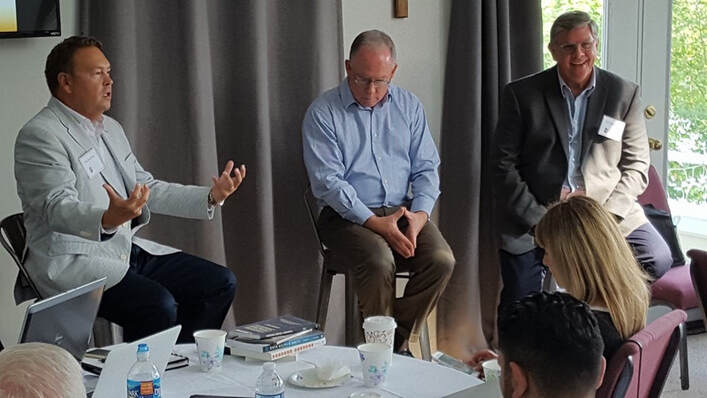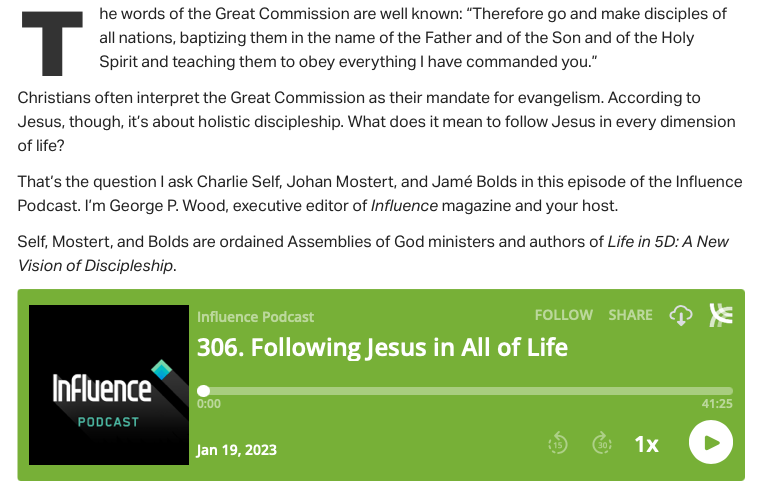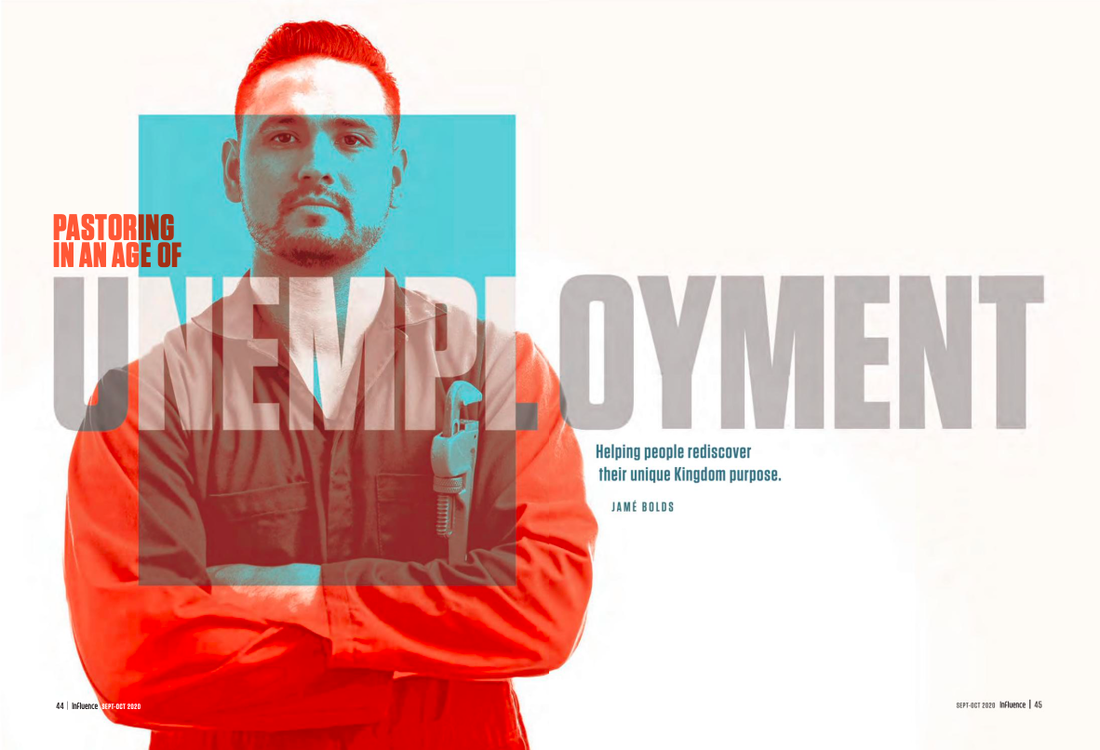 A Few Thoughts I've been thinking about this stuff for years. I don't do alot of writing on leadership. That's kind of my wife's space, Jennifer leads an amazing leadership foundation that trains on emotional intelligence as a practical skill set and her work is pretty incredible. So I try to stay out of that lane. With that being said, leadership is always a practice that executives have to learn as well as some core management skills. Leadership and management are different. At the church and the foundation most of my work is in economics and theological leadership. It's really strategic thinking and practical application for other leaders. I tend to answer the question how do we make their vision possible, that's real strategy. Taking an idea and making it work. Over the past year when I've been traveling, I've seen two things that I think we really need to bring our attention to as leaders. And frankly, I think we need to abandon them. They are what's called the Great Man Theory of Leadership and the Rule of the 49%. Before we get into this, let me directly think out loud -- I am fully aware that these two types of leadership traits are of a boomer (I know ya'll tend to get picked on alot, so sorry) era of leadership. So overcoming them is probably gonna be a real challenge. Here's what I hear all the time -- "There's not a pipeline of leaders coming behind the senior leaders." Well that's not true. All the church planting conferences, training symposiums and funding applications are all going great guns. So what's going on? The reality is there's a pipeline of younger leaders they're just not gonna work for the Great Man and live with the Rule of 49%. Sorry. They ain't working for you, or me for that matter. But they might work alongside ya? The Great Man Theory of Leadership In the 1800s, Thomas Carlyle who was a Scottish historian and intellectual is widely known as arguing that, "The history of the world is but the biography of great men." This has given us the idea that, “Everything rises and falls on leadership”, marketed from John Maxwell’s pithiness who ultimately finds his intellectual roots in Peter Tufano and John Kotter of Oxford and Harvard respectively. When we think about following leaders, I think we simply need to abandon the theory of, “We need to find the right guy.” and adopt a “Who is the best member of the team?” mindset. I'm thinking it would be better if we would strategize away from the “great man” to the idea that he/she would be a “great team” leader. In practice, leaders need to be collaborative rather than directive. I understand fully that the great man theory is the prevailing cultural milieu in our churches. I also understand that even some Gen X and Millennial leaders lead that way. Why? That's what was taught and modeled for them. Let's stop and think for a moment, can we admit that the collective experience has shown us that we need a new animated leadership theory for the Babylonian era that we now live in. Simply put, the old wines skins won’t hold the new wine. The Rule of the 49% The Rule of the 49% is an observation that I made during my time as a campaign manager for United States Congress, District 7 located in the Manhattan facing suburbs of New Jersey. I call it the Rule of the 49% is when leaders tell you 49% of the truth in order to retain power by not giving all the information. As an example, when a leader is asked a direct question not all of the information is devolved rather just enough information is given so that one has enough information in order to get in to action. Team members are not given context to make a solid decision. Rather team members on making decisions based on partial information of which they have partially interpreted so they have partial understanding toward partial outcomes. (In church life it's mostly simply to drive numbers for the weekend experience.) This 49% is not an outright lie, but it is the conscience and deliberate decision to withhold information. Let me be direct, it seems we would all be much healthier if we just abandon this era of leadership. Simultaneously, I do understand that the higher level of leadership, the more level of confidentiality. To this there is no argument. In order to provide uber clarity, collaborative leadership would provide answers like: “At this point, I really don’t know what to do so I’m going to rely on my team.” “Is the answer in the room?” “That is a great question, but I am in conflict with myself.” “What do you think?” “That’s a great question and I have several moving parts that I’m not at liberty to really say anything at this time. I’m sorry, I know that’s not what you want to hear but that’s just kind of where I am as a leader.” I am observing that it is time for a more collaborative leadership style rather than a directive, and one that shares appropriate level of information. I've got a couple other leadership thoughts as I begin to work with large swath and styles of leadership in different kinds of context so I'll have some more thoughts in the next couple weeks. Thank you so much for reading and leave me your thoughts below. So yeah I kinda wrote a book, with two other scholars, Dr. Charlie Self and Dr Johan Mostert.
Dr. Self and Dr. Mostert, started this project a number of years ago and asked me to come alongside them and provide some economic and business insights. It's been a real pleasure to write with them and do this research. So what are we researching? We're asking the question what are the dimensions of whole life discipleship? Influence Magazine did a podcast interview with us where Charlie, Johan, and I all had a great conversation with George P Wood executive editor of Influence Magazine. Click on the graphic below and you can listen to it -- tell me what you think in the comments. A culture of generosity: VICTORY CHURCH PARTNERS WITH THRIVENT TO OFFER FINANCIAL EDUCATION.12/4/2021  This article (PDF) | By Donna Hein / Photo by David and Tiffany Photography Victory Church in Yorktown, Virginia, is what Pastor Jamé Bolds would call an average, small-town church that has stewarded well the resources God has given them. And it’s the principle of stewardship that stands out at Victory. Bolds is a visionary and scholar, who since coming to the church in 2013, has encouraged the congregation to step out of the box and find ways to be generous, especially when the church and its preschool, Victory School, were in the red. Early on, Bolds floated the idea to sell the parsonage, which was paid for but still incurring debt, and create an endowment for the church. By doing so, the congregation reinvested part of the sale proceeds back into the church and started an endowment fund through Thrivent Charitable Impact & Investing™ with the rest. “People didn’t know what an endowment was, so I explained that it’s like a retirement savings vehicle for the church, which never retires,” says Bolds, a Thrivent client with membership. As people donated or left money in their wills to the endowment, it grew quickly and enabled the church to pay off its mortgage of more than $1 million and eliminate the debt that was a burden to the church. “It revolutionized our church,” Bolds says. More recently, the church decided to offer a $1,000 scholarship for children who begin Victory School in the infant program and graduate from the Pre-K4 program. The Victory Scholar Program requires in its guidelines that the scholarship be deposited into a legitimate college savings plan. “The family must meet with a Thrivent financial advisor or other licensed financial advisor to guide them through the process,” Bolds says. “We want to make sure the money is used for future educational purposes. “This is a way we can invest in children’s lives after they leave us. And we can do that because we have an endowment.” Bolds appreciates the relationship between Thrivent and Victory. Pre-COVID, Thrivent financial advisors held a number of workshops at Victory, and Bolds anticipates doing more. “Asset management, money management and financial education, really understanding how money works, are the three big topics,” Bolds says. “And we get a great turnout. We’re really building this into the life of the church.” And the financial clarity that comes from the education enables the congregation to have the culture of generosity it desires. Thrivent Charitable Impact & Investing™, a separate legal entity from Thrivent, is a public charity that serves individuals, organizations and the community through charitable planning, donor-advised funds and endowments. Thrivent Charitable Impact & Investing works collaboratively with Thrivent and its financial advisors. Thrivent is the marketing name for Thrivent Financial for Lutherans. Insurance products issued by Thrivent. Not available in all states. Securities and investment advisory services offered through Thrivent Investment Management Inc., a registered investment adviser, member FINRA and SIPC, and a subsidiary of Thrivent. Licensed agent/producer of Thrivent. Registered representative of Thrivent Investment Management Inc. Thrivent.com/disclosures. Insurance products, securities and investment advisory services are provided by appropriately appointed and licensed financial advisors and professionals. Only individuals who are financial advisors are credentialed to provide investment advisory services. Visit Thrivent.com or FINRA’s Broker Check for more information about Thrivent’s financial advisors. Also in this issue:Achieve work-life balance as financial advisor Spread Christmas kindness Thrivent clients put generosity in action Here's some reflection on the sabbatical that finished in the summer of 2021. My hope is that it gives you a blueprint so that you can plan your pastoral sabbatical. It's a great time to rest and hear the word of the LORD. Here's how my sabbatical went... In the fall of 2019 I went to my board and I requested several weeks off during the summer of my daughters high school graduation. We have been at Victory Church 8 years now and I needed a sabbatical, I just needed some time to rest. I needed some time to reflect on our ministry and I needed to carve out some time to work on my Ph.D. When I asked our board about it I was pleasantly surprised at how receptive they were about the whole idea. I asked my board if they knew what a sabbatical was? My one board member answered pretty quickly and I think summed it up so well -- he said, "Yeah, isn't a sabbatical where are you stop doing your main job and you go do another job that makes your main job better." I was completely blown away because that's 100% right. Sabbatical is not a multi-week vacation. It's a time to reflect, think, study and rest so you can get gear up for the next season of leadership.
Here's some real practical steps for planning a successful sabbatical:1. Start Early & Get a Plan. a.) Start Early. I worked with my board and leadership team a year before the proposed sabbatical. We mapped out every Sunday as to what guest or in-house communicator would be teaching that Sunday. We worked with the kids ministry and set up various summer events. b.) Recruit a Leader. Now, in my case my co-lead pastor, my wife, Pastor Jennifer Bolds lead the church during the summer. I can hear the noise already, "OMG", "Your wife", "Such a cliché", and "Co-lead pastor", blah, blah, blah. Yah. So my wife, Jennifer Bolds is a Gordon-Conwell grad, a practicing marriage and family therapist, a leadership consultant who trains scientists and engineers how to use emotional intelligence as a practical skill set, and leads her own foundation plus she's a professional musician. So...if your wife can match that, great! If not, sit down. She did a great job and church grew by several families while I was gone. Somebody else can lead while you're not there. Find a retired pastor, have one of your staff pastors, a denominational or network pastor to lead for the summer — it will be fine. Believe me they would love to pastor your church through a summer. They'll probably do it for free or really cheap. (For 8 weeks, I'd do it for like $250 a Sunday - It would be fun.) c.) Get a Plan. I wrote up a schedule of every week and put everything in there. What I planned to produce, the church services I wanted to attend, family vacation and I even landed an office at a friends church across town. 2. Disappear. Here's the reality as a lead pastor you're important but you're not that important. Disappear and trust your sabbatical pastor to lead the church. When I mean disappear, I mean literally disappear. 3. Get Paid. In all fairness, the reality is your church should continue to pay your salary and should probably give you a stipend for the summer. If your church is not going to fund your sabbatical you might wanna have a denominational official or a trusted pastor in the area come talk to your board. Also start fundraising, whatever you think you might need. Simply, go ask. It will come in...You can raise that money. There's more people out there that care about you than you think you know.
4. Plan for Outcomes. So at the end of a number of weeks what do you want to show for it? I personally don't think, and this just might be me, that sleeping in and some summer vacation pictures is a good stewardship of your churches finances. I mean heck, yeah I did all that... But not only that. You want to produce something. 5. Leadership Sessions. I've already contracted with the Jennings Leadership Group to have a 1 on 1 session with an organizational psychologist who did her PhD at Rutgers where the famed Daniel Goleman is a professor. Professor Goleman is the author of Primal Leadership, and godfather of emotional intelligence, and well that's a constant growth area for every executive leader. 6. Engage in "Fun" work. So I realize I'm kinda high strung. I totally get that, not every pastor is gonna be this ambitious but here's what I've planned in my sabbatical: a.) Research and Write. I planned to finish chapter 3 in my Ph.D. dissertation which is about 35 to 40 pages in round numbers; this should give me a roadmap for the next phase of research. (I did accomplish this but it will take me until the end of September to clean and edit it.) b.) Visit Other Churches. Since I'm not preaching at Victory; I went to see my friends churches. Every Sunday I would go to an 8:30am service at one church and then go to another church's service at 10 AM. All in all, I visited 14 Sunday morning services. c.) Write a book. I know, I know I hear ya. But the popular book I'm writing flows out of the research for my Ph.D. so I'm killing two birds with one stone. I completed a book proposal and wrote 2 chapters. d.) Go on Vacation. During my sabbatical I went to OBX with my wife for a couple days, we went on a family vacation to the islands, and we took a family trip to Boston to drop off my daughter at Gordon College. YIKES! e.) Read. I read about 20-30 books in a 8 week time frame. That's a good mix of Ph.D. research books plus some leadership and some financial literacy save for retirement make money books. f.) Crazy. If I could have gotten all that done, and that’s a big if, in the last 2 to 3 weeks, I planned to study for my certified business economist license. Why? Because I just think that would be cool to be a certified business economist and a practicing pastor. (What a nerd). 7. Have a “Re-entry” Plan. What do I mean by that? Your church people haven't seen you for a few weeks now and you just show up like everything's fine? Nope. a.) Leaders. I'll connect face to face with my pastoral staff, board and leadership teams and communicate what I've learned and where we are going since I've come down from the mountain. b.) Letter. I'm going to send a letter out letting people know that I'm back and inviting them to a new series called, "God Speaks!?" I'll outline some things that LORD told me and where the church needs to go. c.) Coffee. On my first Sunday back we're going to have "Discover" at my house, which is time where visitors learn more about Victory. I'm also going to launch "Java with Jamé" where every Thursday morning from 7am-Noon I'm just going to camp at coffee shop and people can stop by. All right well that was my sabbatical plan and the journey was amazing. The Lord really spoke to me and showed me so much. I'm forever grateful, thank you Victory Church. |
bio:+ Economic Theologian |






 RSS Feed
RSS Feed